Key takeaways:
- Ethical travel involves supporting local communities and minimizing environmental impact, reflecting social responsibility via conscious choices.
- Feminist fashion serves as a vehicle for empowerment, inclusivity, and sustainability, encouraging consumers to align their clothing choices with their values.
- Personal experiences in ethical travel and feminist fashion emphasize the importance of engagement, mindfulness, and fostering meaningful connections with local cultures.
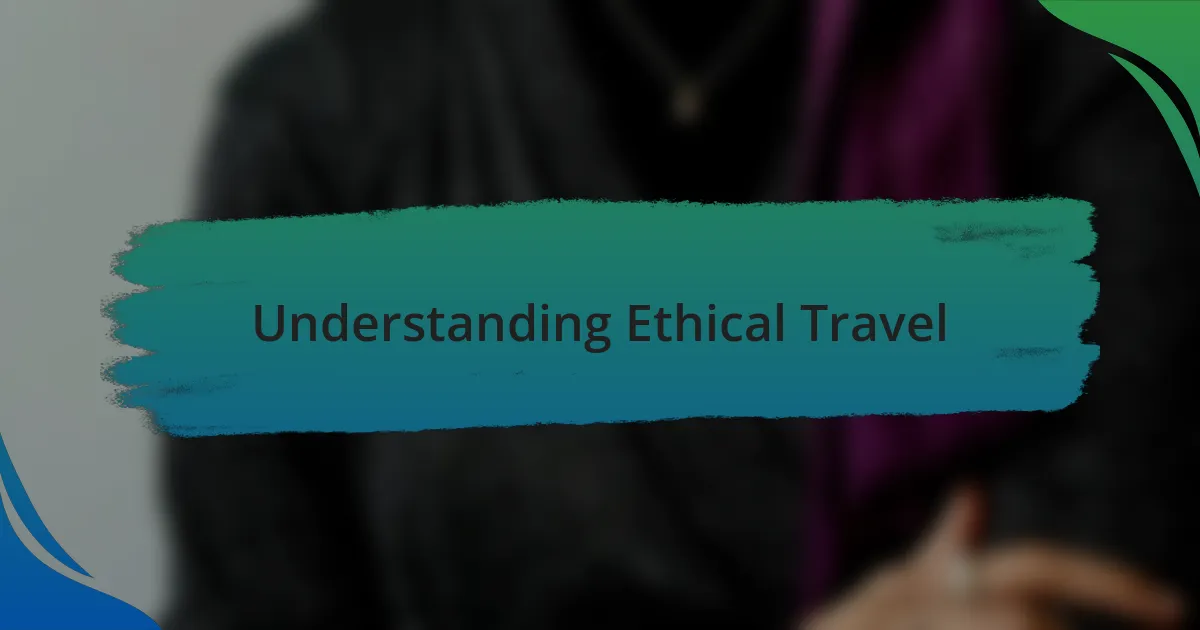
Understanding Ethical Travel
Ethical travel goes beyond simply visiting new places; it involves a conscious effort to ensure that our presence positively impacts local communities and environments. I remember visiting a small village in Thailand, where I learned firsthand the importance of supporting local artisans instead of buying mass-produced souvenirs. This experience made me wonder: how often do we consider the ripple effects of our travel choices?
Sustainable tourism invites us to consider aspects like carbon footprints and local economies. For instance, when I hiked in the Andes, I chose to stay at eco-friendly lodges run by Indigenous families. Not only did this provide me with a more authentic experience, but it also sparked an emotional connection to the land and its people. This leads me to ask: how can we become more intentional travelers and deepen our connection to the destinations we explore?
As I explore the world, I find myself reflecting on how our travel habits weave into a larger narrative of social responsibility. Each trip has the potential to either support or undermine local cultures. Have you ever thought about how your travel choices can reflect your values? By understanding and embodying the principles of ethical travel, we can create a positive legacy that resonates long after our journeys have ended.
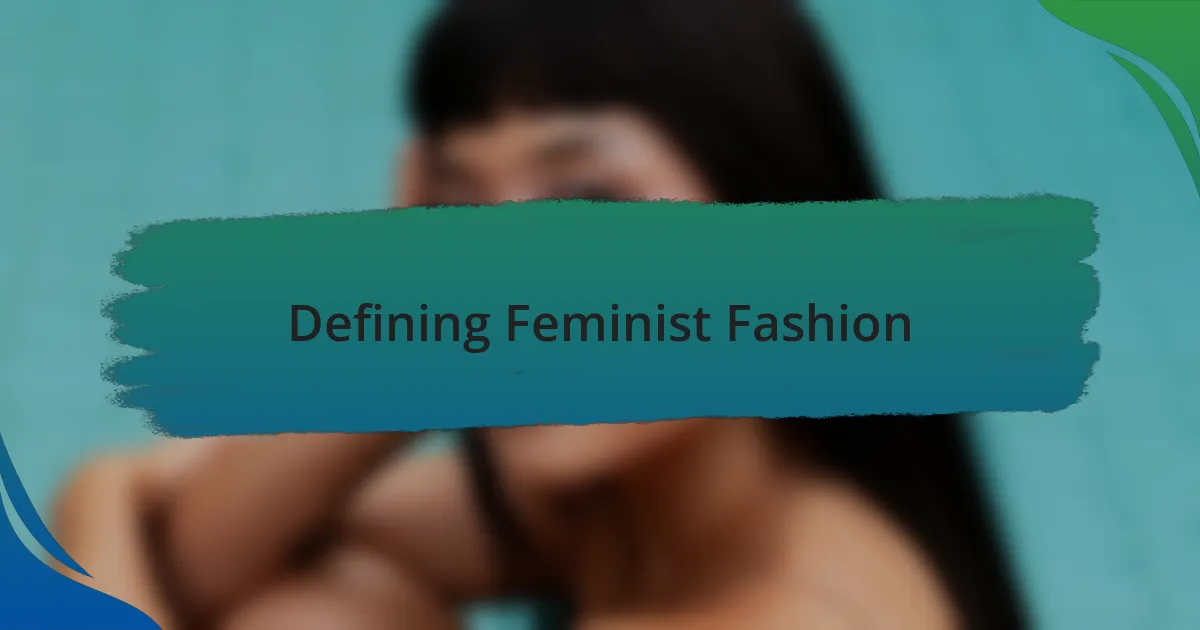
Defining Feminist Fashion
Feminist fashion is not just about clothing; it’s a statement of values and ideals that advocate for equality and empowerment. When I attended a local women’s market showcasing handmade garments, I was struck by how each piece told a story, often reflecting the struggles and triumphs of the women who created them. Isn’t it fascinating how what we wear can serve as a powerful tool for social change?
At its core, feminist fashion emphasizes inclusivity and diversity, defying traditional beauty standards and embracing all body types. I recall watching a fashion show featuring models of various sizes and backgrounds, and it felt like a celebration of authenticity. This experience made me ponder: why should fashion conform to outdated norms when it can promote self-acceptance and solidarity instead?
Moreover, feminist fashion prioritizes sustainability and ethical production methods. I once discovered a brand committed to fair wages for their workers, and it was refreshing to know that my purchase directly supported a better livelihood for those behind the scenes. How empowering would it be if more brands adopted this philosophy, allowing consumers to champion social justice with every outfit they wear?
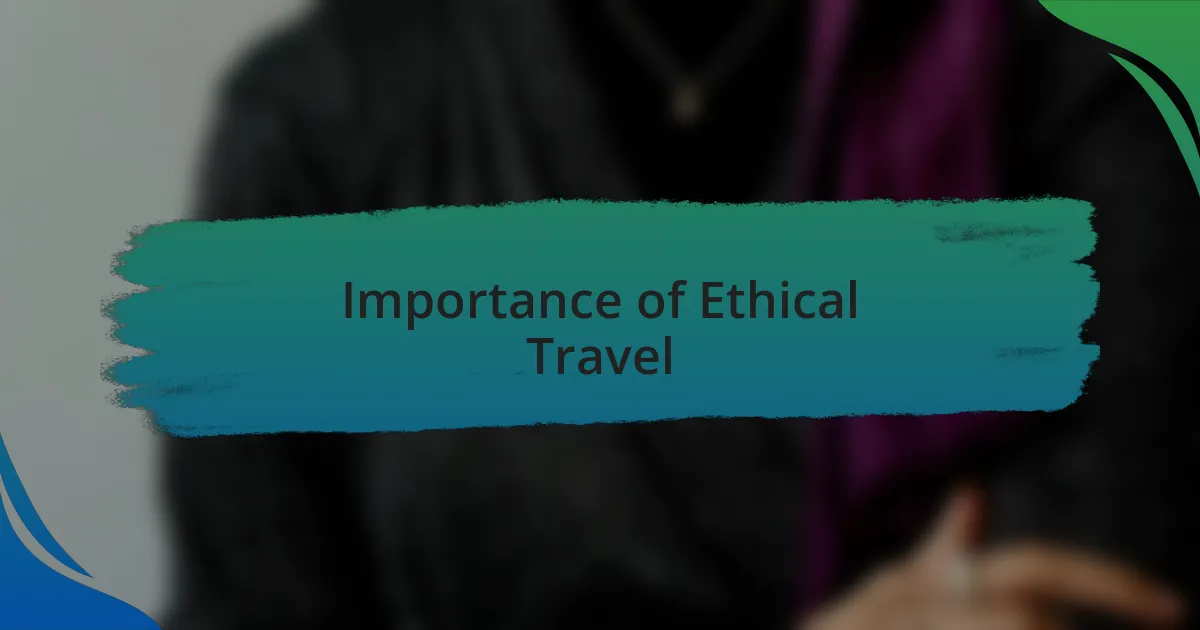
Importance of Ethical Travel
When I embarked on my first trip focused on ethical travel, I was astounded by the ways in which my choice of destination influenced not just my experience, but also the local communities I visited. I learned that supporting local economies through responsible tourism can create jobs and empower women, ensuring they have a voice in their communities. Isn’t it remarkable how our travel choices can directly impact the lives of those we encounter?
Ethical travel also opened my eyes to cultural respect and appreciation. I remember joining a workshop that taught traditional crafts led by local women artisans. This not only allowed me to connect on a personal level but reinforced the importance of preserving cultural heritage. It made me question: how often do we consider the cultural implications of our travel, and are we truly being respectful of the places we visit?
Furthermore, the environmental aspects of ethical travel cannot be understated. I’ve seen firsthand how eco-friendly accommodations and responsible wildlife tourism can protect the planet and foster sustainable practices. When I stayed at a green lodge, the care taken to minimize waste made me realize that every small step contributes to a larger goal. What if we all made more conscious choices while traveling? Wouldn’t our shared planet be in a better state?
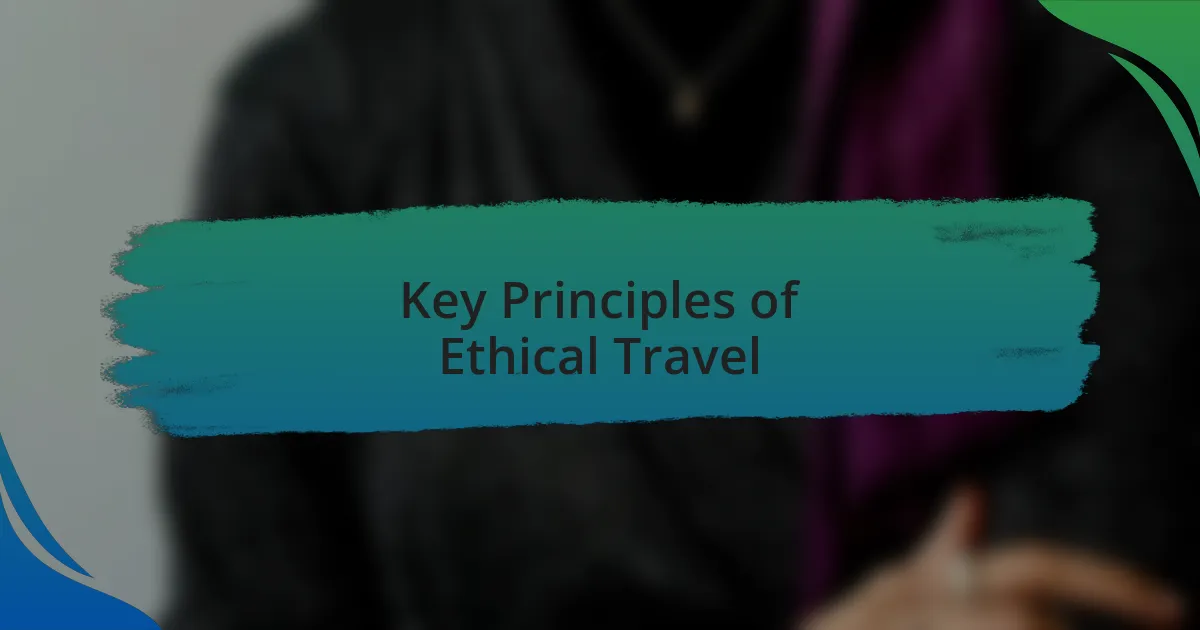
Key Principles of Ethical Travel
When I think about the key principles of ethical travel, one important aspect is transparency. I’ve often found that engaging with local guides about their communities’ needs has enriched my experiences in ways I never anticipated. It’s crucial to ask questions and understand how our presence can best serve those communities. Have you ever wondered how your travel choices align with the local realities of the places you visit?
Another principle revolves around minimizing our environmental impact. On one trip, I chose to hike instead of relying on motorized transportation, and I was rewarded with stunning views and a deeper connection to the environment. This choice not only reduced my carbon footprint but also allowed me to appreciate the beauty around me in a more meaningful way. How can we ensure that our travels leave the places we love better than we found them?
Lastly, fostering women’s empowerment is a principle close to my heart. I recall visiting a cooperative where women produced handmade textiles, and hearing their stories was a profound reminder of the strength and resilience within those communities. Supporting businesses that prioritize gender equality can create rippling effects, enabling women to thrive. Have we considered the ways we can champion women’s voices through our travel choices?
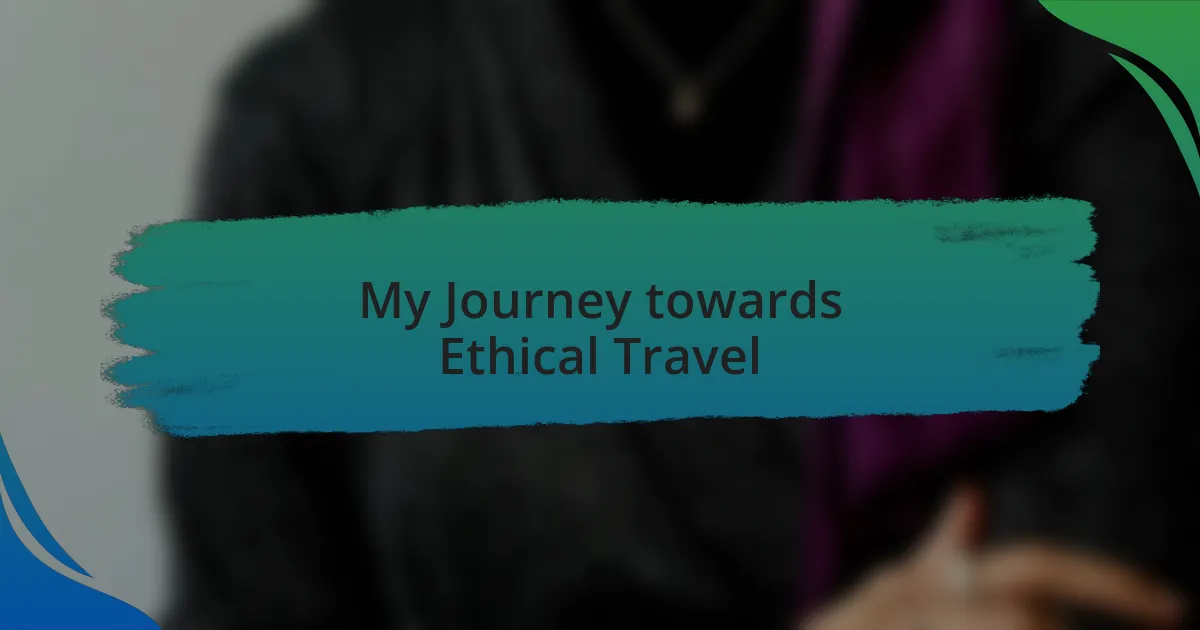
My Journey towards Ethical Travel
My journey towards ethical travel began when I first stepped into a small village in Southeast Asia. I remember feeling overwhelmed by the beauty around me, but it quickly turned into guilt when I realized I was one of many tourists trampling through their home. That experience made me deeply reflect on my role as a traveler. What did I truly know about the culture and struggles of the people living there? This sparked a commitment to learn and engage more meaningfully with the local communities I visit.
One memorable experience was during a trip to South America, where I volunteered with a local women’s cooperative. I was amazed by their ability to blend traditional craftsmanship with modern design. As I watched them create beautiful products, I felt a connection that transcended language barriers. Their stories resonated with me; it was clear that supporting their work meant empowering them to pursue their dreams. Have you ever felt that sense of purpose when giving back while traveling?
As I continued my travels, I gravitated toward destinations where ethical tourism was not just a buzzword but a lifestyle. I remember arriving at an eco-lodge, greeted by a team passionate about conservation and community collaboration. It opened my eyes to how travel can actively protect natural resources while uplifting people. I often ask myself now, how can I be part of that positive change? It’s about making intentional choices that prioritize the well-being of both the environment and its inhabitants.

Personal Experiences with Feminist Fashion
Experiencing feminist fashion has been a transformative journey for me, one that intertwines personal expression with a commitment to social change. I distinctly remember my first encounter with a feminist fashion brand at a local pop-up shop. The vibrant colors and empowering slogans spoke to me, not just as a consumer but as someone who resonated with the message. It made me wonder: how often do we choose clothes that reflect our values?
One striking moment occurred when I wore a dress designed by a female artisan collective during a gathering. As I received compliments, I felt an overwhelming sense of pride knowing that my choice supported women in underserved communities. Each stitch represented their stories and struggles, which made me reflect on the direct impact of my fashion choices. I often think, how can my wardrobe be a platform for awareness and empowerment?
Additionally, I’ve found that engaging with feminist fashion brings about fascinating conversations. Recently, while discussing sustainable clothing with friends, I realized how these discussions often lead to deeper reflections on societal issues. I was struck by how clothing can serve as a catalyst for dialogue—don’t we all want our style to evoke thought and inspire action? Embracing feminist fashion is about more than aesthetic—it’s a lifestyle that encourages authenticity and amplifies voices that deserve to be heard.
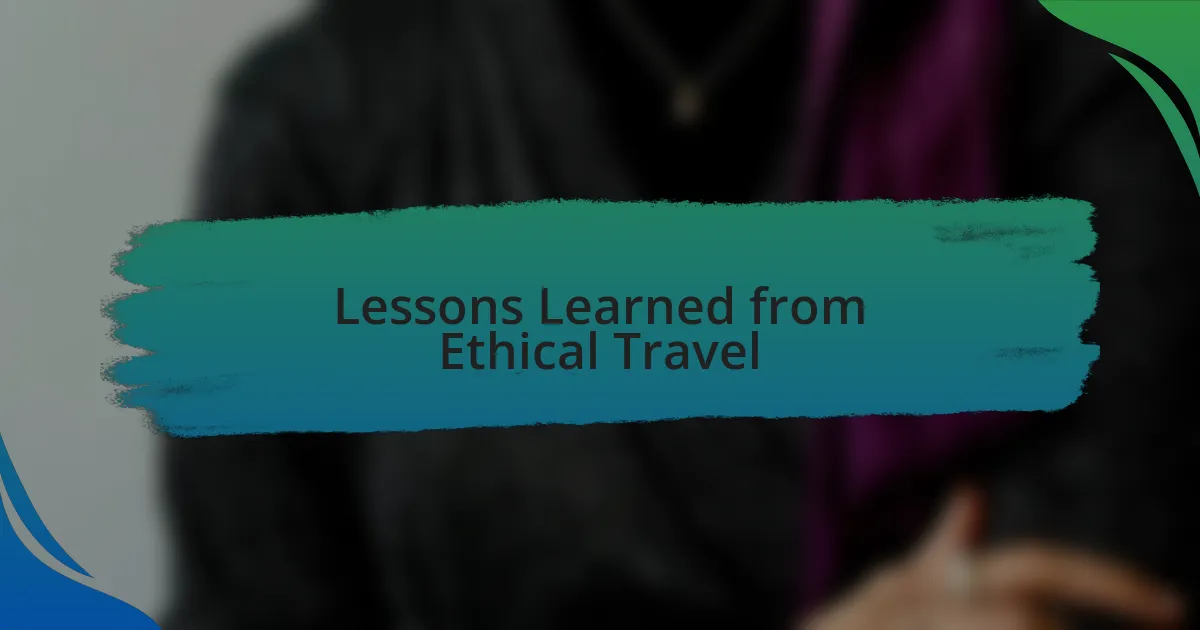
Lessons Learned from Ethical Travel
Through my journey in ethical travel, I’ve come to appreciate the profound lesson of mindfulness in every decision I make. While exploring a small village in a developing country, I met artisans whose livelihoods depended on tourism. This experience made me realize how crucial it is to support local economies. I often ask myself: how does my presence contribute positively instead of adding strain? Engaging consciously can turn travel into a mutually beneficial experience.
One poignant moment struck me when I volunteered in a community project focused on women’s empowerment. The way the local women shared their knowledge and skills was truly inspiring. I learned that ethical travel isn’t just about visiting places; it’s about nurturing connections that uplift marginalized voices. It made me rethink how personal connections during travels can enable more authentic experiences and deepen our understanding of different cultures.
Additionally, witnessing firsthand the impact of sustainable practices reshaped my perspective on consumption. I remember struggling with my choices at a local market: should I purchase a beautiful item that wasn’t ethically sourced, or should I invest in something that truly supports the craftsperson? This decision process taught me the value behind every dollar spent, showcasing how ethical choices resonate far beyond the moment of purchase. Have you ever considered how your travel choices ripple through the lives of others? I certainly have, and it has prompted a deeper reflection on the ethics of my personal spending habits.